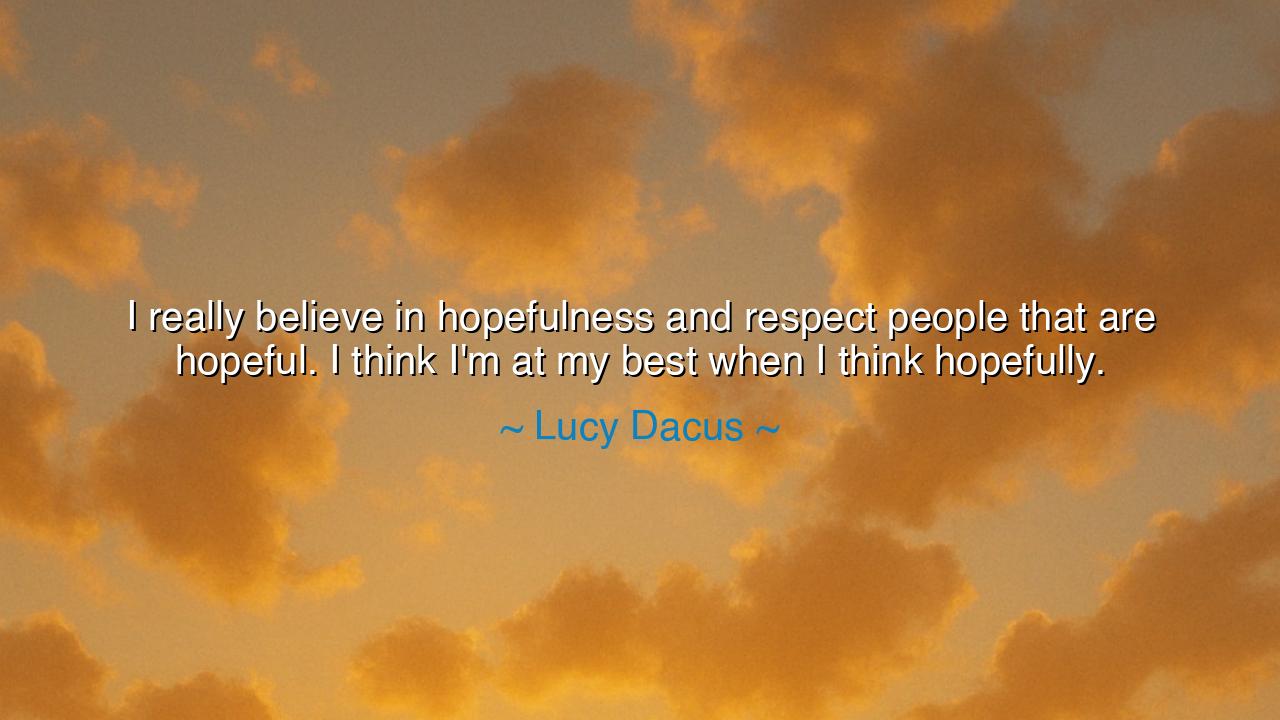
I really believe in hopefulness and respect people that are
I really believe in hopefulness and respect people that are hopeful. I think I'm at my best when I think hopefully.






The words of Lucy Dacus—“I really believe in hopefulness and respect people that are hopeful. I think I’m at my best when I think hopefully.”—speak with the quiet power of a timeless truth. They remind us that it is not despair, nor bitterness, that strengthens the spirit, but hope. This radiant force is more than a fleeting emotion—it is the flame by which men and women endure the long night of suffering, and the light that reveals the path to greater tomorrows. To walk in hopefulness is not to deny hardship, but to meet it with unyielding resolve, believing that the dawn will rise, even when the sky is darkest.
The ancients taught that the soul must be guarded, for it can be consumed by shadows of doubt. Yet the wise knew that hope is the shield of the heart. When armies faltered, it was hope that rallied them. When empires crumbled, it was hope that rebuilt them. When sickness ravaged, it was hope that guided healers to continue their labor. Lucy Dacus’ words remind us that hope is not weakness, but strength; not naivety, but vision. She declares that she is at her best when she thinks hopefully, for hope clarifies, unites, and empowers the mind to act with courage rather than fear.
Consider the story of Nelson Mandela, who spent twenty-seven years imprisoned, cut off from freedom, from family, from the life he knew. Many would have surrendered to bitterness in such a place, yet Mandela clung to hope—hope for justice, hope for freedom, hope for a South Africa reborn without chains of hatred. That hope sustained him, and when he emerged, he carried not vengeance, but reconciliation, leading a nation into healing. Without hope, his spirit might have withered; with hope, he became a beacon for the entire world.
Hopefulness is not blind optimism. It does not pretend that life is free of suffering. Rather, it faces suffering with the conviction that pain is not the final word. It is the farmer planting seeds though storms threaten; it is the mother comforting her child through hunger, believing tomorrow will bring food; it is the artist, like Lucy Dacus herself, creating songs that shine a gentle light in the gloom of human struggle. To respect those who are hopeful is to recognize in them a sacred fire, a resilience that refuses to be extinguished.
Yet we must also acknowledge that the world tempts us to surrender hope. There are voices that sneer, saying it is foolish to believe in better things. There are burdens that weigh heavily, whispering that change is impossible. But to heed such voices is to embrace despair, and despair is the slow death of the soul. The ancients warned that those who lose hope cease to live even before death claims them. Thus, Dacus’ wisdom is not mere sentiment—it is survival itself.
The lesson for us is clear: cultivate hopefulness within yourself, and honor it in others. Do not mock those who dream, for their dreams may become the foundations of the future. Instead, join your strength to theirs, so that hope may grow. In your darkest moments, when you feel most powerless, turn your thoughts toward the horizon and believe that another day, another chance, will come. In that belief, you will find the strength to act, to endure, to rise.
Practical action begins with small things: speak words of encouragement rather than cynicism. Surround yourself with voices that uplift rather than those that drag into despair. When challenges come, remind yourself of times when hope carried you through before. And offer your own hope to others, for sometimes a kind word, a gentle gesture, a simple affirmation can reignite the flame in someone else’s heart. By doing so, you weave yourself into the great fabric of resilience that binds humanity together.
So let us take Lucy Dacus’ teaching to heart. Let us believe in hopefulness, respect those who carry it, and strive to think hopefully ourselves. For hope is the wellspring of creativity, of endurance, of life itself. In times of trial, it is hope that makes us our best, lifting us beyond fear and into the realm of possibility. May we carry this truth forward, as our ancestors did, passing it from heart to heart, so that the flame of hope never dies, but burns eternal across the generations.






AAdministratorAdministrator
Welcome, honored guests. Please leave a comment, we will respond soon